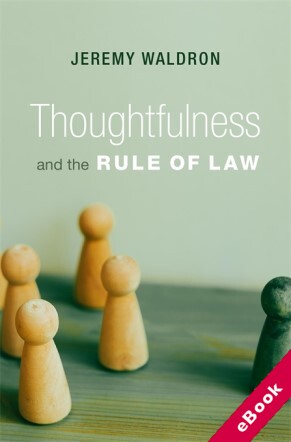
The device(s) you use to access the eBook content must be authorized with an Adobe ID before you download the product otherwise it will fail to register correctly.
For further information see https://www.wildy.com/ebook-formats
Once the order is confirmed an automated e-mail will be sent to you to allow you to download the eBook.
All eBooks are supplied firm sale and cannot be returned. If you believe there is a fault with your eBook then contact us on ebooks@wildy.com and we will help in resolving the issue. This does not affect your statutory rights.
An essential study of the rule of law by one of the world’s leading liberal political and legal philosophers.
The meaning and value of the rule of law have been debated since antiquity. For many, the rule of law has become the essence of good government. But Jeremy Waldron takes a different view, arguing that it is but one star in a constellation of ideals that define our political morality, ranking alongside democracy, human rights, economic freedom, and social justice.
This timely essay collection, from one of the most respected political philosophers of his generation, is a brief on behalf of thoughtfulness: the intervention of human intelligence in the application of law. Waldron defends thoughtfulness against the claim that it threatens to replace the rule of law with the arbitrary rule of people. To the contrary, he argues, the rule of law requires thoughtfulness: it is impossible to apply a standard such as “reasonableness” on the basis of rules alone, and common legal activities like arguing in court and reasoning from precedents are poorly served by algorithmic logics. This rich compilation also addresses the place of law in protecting human dignity, the relation between rule of law and legislation, and whether vagueness in the law is at odds with law’s role in guiding action.
Thoughtfulness and the Rule of Law emphasizes the value of procedures rather than the substance or outcome of legal decisions. Challenging the view that predictability and clarity are cardinal virtues, Waldron shows that real-world controversies often are best approached using a relatively thin concept of the rule of law, together with the thoughtfulness that a legal system frames and enables.
Jeremy Waldron is University Professor in the School of Law at New York University.